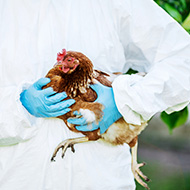Avian influenza confirmed in Norfolk

Avian influenza H5N1 has been confirmed at a poultry farm near Gayton, Norfolk.
The Animal and Plant Health Agency (APHA) has confirmed a case of highly pathogenic avian influenza at a premises in Norfolk.
Avian influenza H5N1 was confirmed on Sunday (21 August) at a poultry farm near Gayton, Norfolk.
A 3km Protection Zone and 10km Surveillance Zone have been placed around the premises. All poultry on the premises will be humanely culled.
The discovery comes days after H5N1 was confirmed in captive wild birds at a site in Cornwall. It also makes it the sixth case to have been confirmed in the UK this month.
On 16 August, the government lifted the Avian Influenza Protection Zone (AIPZ), introduced in November 2021, to help stop the spread of the disease.
The enhanced biosecurity measures were introduced when there was a medium risk for some poultry premises. Defra reduced the risk level to low for all poultry in August, meaning the mandatory requirements could be lifted.
The UK's chief veterinary officer, Christine Middlemiss, called on bird keepers to maintain enhanced biosecurity measures to prevent the risk of future outbreaks.
“Now we are in the summer months and experiencing higher temperatures, the risk to poultry has now been reduced across Great Britain and so the time is right to lift the Avian Influenza Prevention Zone,” she said.
“This would not have been possible without the hard work of all bird keepers, who have upheld high biosecurity standards for many months. However, there are still localised areas of risk as we have seen recently, and therefore it’s vital that everyone keeps biosecurity and cleanliness at the forefront of their minds to keep their flocks safe.”
Since October 2021, there have been 111 cases of avian influenza H5N1 in England, 11 in Scotland and five in Wales.



 The Animal and Plant Health Agency (APHA) has updated its online reporting service for dead wild birds.
The Animal and Plant Health Agency (APHA) has updated its online reporting service for dead wild birds.